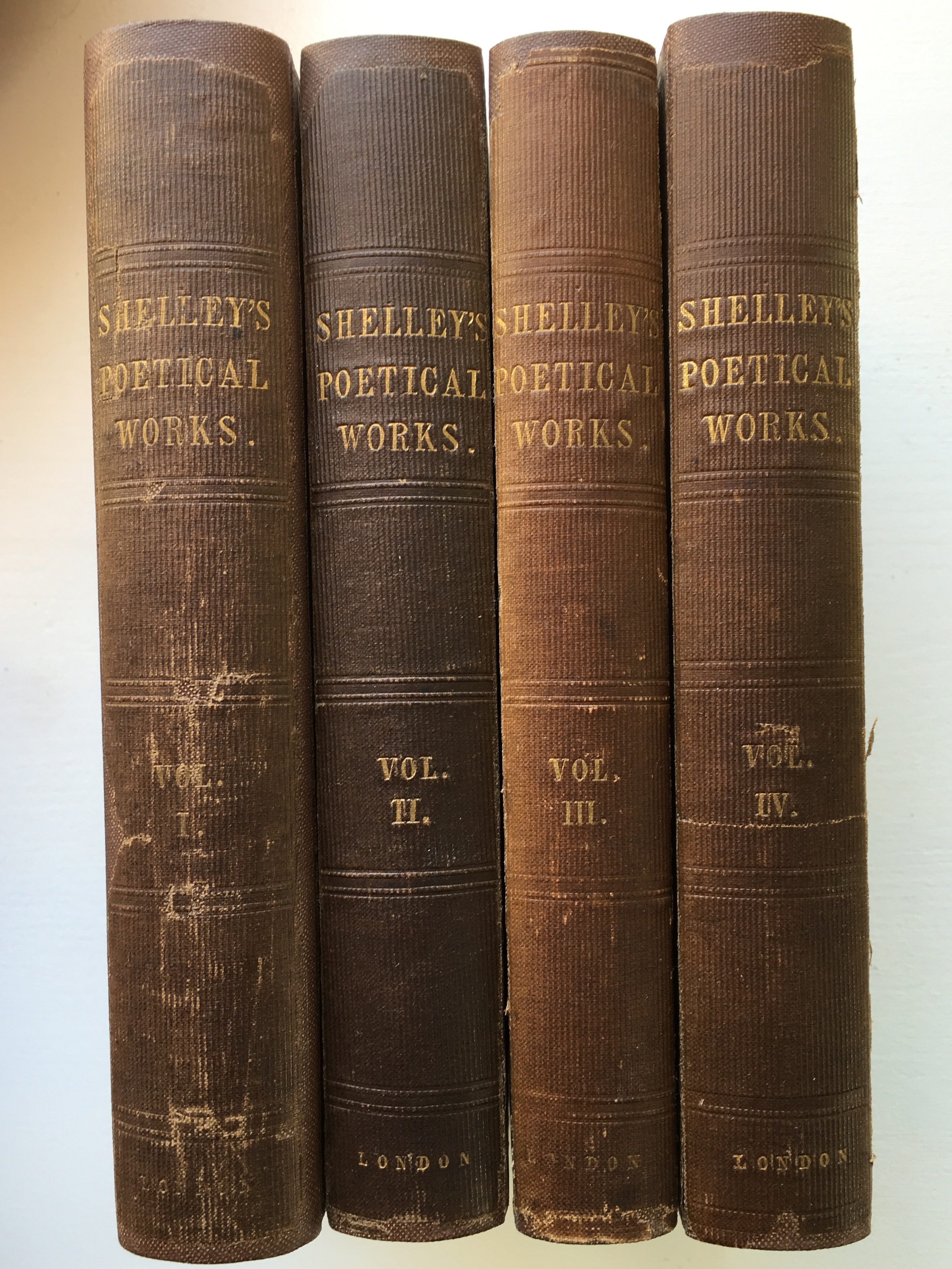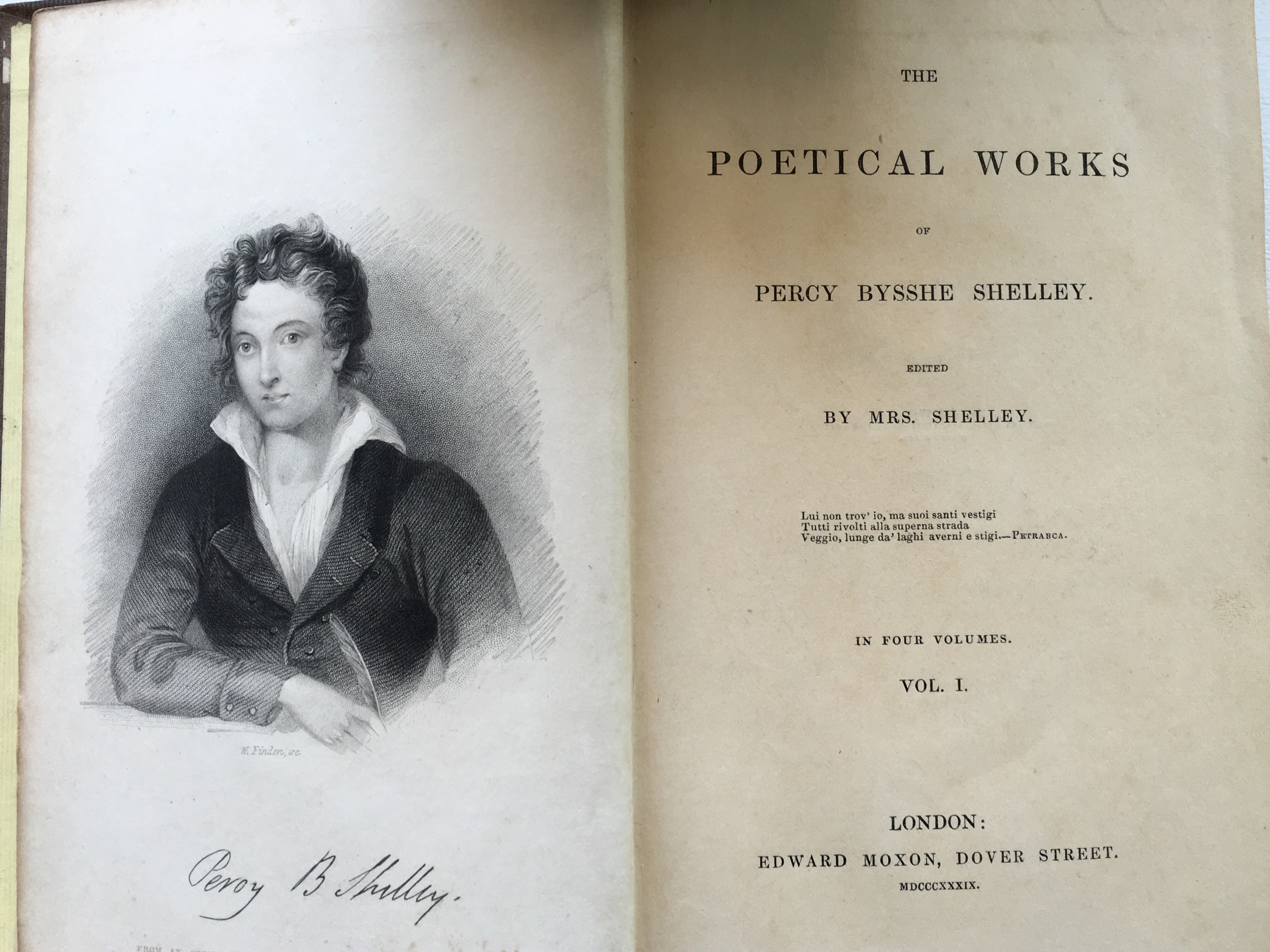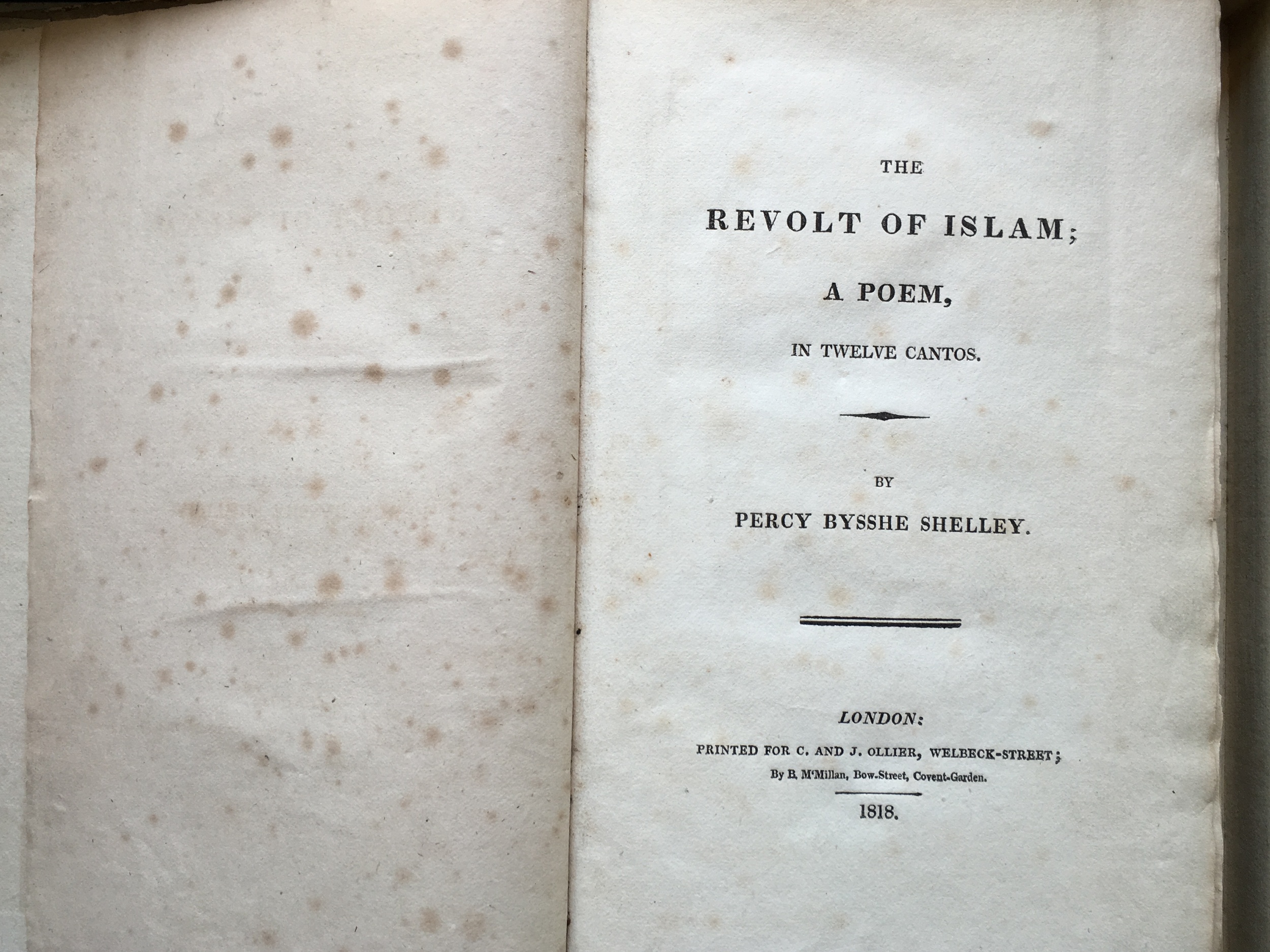My Father's Shelley; a Tale of Two Shelleys
When I was very little, my father, dissatisfied with the state of my education, decided that he would offer Sunday evening lectures in his library. And so each Sunday, at exactly the time Bonanza was on, my brother and I would be herded into the library, moaning and complaining. A chalk board was produced. And the entire history of the Greek and Roman world played out, slowly, labouriously, on that chalk board over the ensuing years...or at least it seemed like years.
In addition to ancient history, recent poetry was assigned for memorization. When I say recent, I mean poetry from the 18th and 19th centuries. To this day, I have a little volume of around 20 poems that he gave to me – all specially selected. It was quite a cross-section.
We would actually be QUIZZED on poetry and history!! As if school wasn't bad enough. There were, however, incentives. I think we got 50 cents for every poem we could successfully recite. I recently found a little postcard that he sent home from one of his travels. It ended with a gentle admonition to make sure I had something new memorized for him upon his return. I discovered one of the quizzes years after his death. Have a look...how well would a 10-12 year old do today? -- how well would a university student do?!
Now as much as this grated on me when i was young, it did engender in me a love for classical culture and poetry. It also led to some amusing disagreements over the years. My father was deeply aggrieved, for example, that I failed to enshrine Pope's translation of the Iliad as the only translation worth having. On one visit to our home, he stood at my bookshelves gazing with open dismay on my collection of translations of the Iliad - at that time well over a dozen. He thought this was perverse. My wife ventured the thought that it must be wonderful to see a seed that he had planted grow to such fruition - but he was having none of it; I had sinned against Pope, the God of the Iliad. Weeks later, the issue was still occupying his thoughts. At a lunch with my brother, agitated, he put down his knife and fork and asked my brother what was wrong with me. Alexander Pope had been good enough for him (and by extension the entire world), why did I feel the need to venture afield and embrace these other pretenders: "Ross, what is wrong with Alexander Pope?" he lamented in his highly theatrical voice. What indeed?!
Later in life he also came down firmly on the side of the Greeks. Once, my brother gave him a book on the emperor Diocletian. Dad promptly returned the book unread, bitterly remarking upon Ross' and my putative adherence to Roman civilization - "The Romans," he remarked dismissively, "were nothing but bully-boys." But I digress.
As I grew up, like most boys, I actively sought out things to like and do that distanced me from my father. For example, I spent most of my high school years studying maths – a subject matter as alien to my father as any subject on earth. Then I went to University to be a geologist. Disaster. I finally dropped out and worked for a year or so, only to return to University where I ended up studying English Literature. I am not sure what it was that led me to Shelley. But something did…. perhaps the awful shadow of some unseen power. I went deeper and deeper: first an undergraduate thesis and then an MA thesis (undertaken under the supervision of that great Shelley scholar, Milton Wilson). I even started out on a PhD before I came to my senses.
Anyway, to the point. In those days, when one’s thesis was completed, they would bind up a couple of copies for you. Now by this point in my life, I have to confess, somewhat ruefully, that my father and I were barely on speaking terms. Nonetheless, like most young men, I still craved his approval. So, thesis in hand, I traveled to the family homestead to see my parents. Burning a hole in my briefcase was a copy of my thesis: “Prometheus Unbound and the Problem of Opposites.” (Hopefully soon to be published in this space!)
He was in his library. After spending sometime in the kitchen with my mum, I screwed up my nerve and knocked on the door. He called me in. As always, we had to stand at the door waiting for him to finish whatever thought it was that he was in the midst of jotting down. He was ALWAYS writing, furiously, on a clipboard. Finally, after what seemed an eternity, he looked up and said hello.
I explained what I was doing. I presented him with the thesis. And then something truly surreal happened; something that seared itself into my memory. Without really looking at it, he smiled absently, congratulated me and turned to walk toward his library shelves with my thesis. He casually remarked over his shoulder, “Thank you, Gra, I shall put it with the rest of my Shelleyana.”
Time slowed to a stop. I remember struggling to understand what that could mean. But my gaze followed his hands, up, up, up to the higher shelves. And there it was…sweet mother of god…maybe 10 linear FEET of books on Shelley.
Approximately 1/3 of my father's "Shelleyana". Most of these books are first editions.
I did not realize at the time, but this collection also happened to include a first edition of “The Revolt of Islam” and the four volume 1839 Collected Works that Mary put out. I kid you not. In fact, it turned out that almost everything up there on those shelves was a first edition of some sort. It was like an Aladdin’s cave specially built for Shelley scholars. People like ME…people like…oh my god…my DAD!! Click on the image to see the slide show:
Inscription to my brother in Hutchinson's Collected Works of Shelley
Now in retrospect, none of this should have really been a big surprise. For starters, my brother’s middle name is Shelley (I am not sure he appreciated the choice as a boy). Dad had given him a copy Hutchinson's "The Complete Poetical Works of Shelley" (a gorgeous single volume, with gilt edged paper and blue calf skin binding) in 1956...AT AGE ONE!! It bore an inscription to my brother: 'The secret strength of things / Which governs thought, and to the infinite dome / Of heaven is as a law, inhabits thee!.'
My markups to Hutchinson's "Poetical Works of Shelley" -- given to my brother at age 1.
I knew this because it was this volume I had used throughout my entire course of Shelley studies.
And then, finally there was that other piece of evidence: there had been a Shelley poem in that little black volume I was given when I was around 10. As it turned out, Shelley was my father’s favourite poet. The man I barely spoke to, the man I had spent most of my life distancing myself from, was -- just like me -- devoted to Percy Bysshe Shelley. This was a sobering and disquieting revelation. As I reflect back on this, what I wonder is this: was it THAT poem? Was it Shelley's poem, the one he gave me to memorize, that planted the seed which flowered so many years later?
Well, before we get to that, I am afraid to say that it actually gets weirder. As I stood there, my jaw working, no sounds coming out of my mouth, he turned back to me and asked me what I meant by the “Problem of Opposites.” He asked if this was a reference to Jung, by any chance. By this time I knew where this is going -- there was an inevitability to it; there was an inexorable fate at work. He then gestured vaguely across the room at another shelf load of books. Yes, that’s right: The Complete Works of C.G. Jung. He asked if I would like to borrow any of them if I was continuing my studies on Jung and Shelley.
Because, of COURSE, that is EXACTLY what I had spent the better part of four years doing - applying Jungian theory to the study of Shelley's poetry.
I should point out that my approach to Shelley was so arcane and unique that my thesis supervisor, Milton Wilson, had a hard time drumming up professors to quiz me. It was niche to say the least. Yet somehow I had stumbled onto a course of study that duplicated two of my father's keenest interests.
Retreating from the library in some bemusement, I walked into the kitchen and my poor mother looked at me in dismay. “You look awful,” she said, “You look like you just saw a ghost. What happened in there?” Good question.
I can laugh about all of this now. But then? Not so much. I was young and desperate to be different.
As I sat at the kitchen table trying to sort through my emotions, I thought, “Well, at least, I now have something to talk to him about”. And so a desultory communication began. But this too soon turned into almost open warfare. My father’s Shelley, as I VERY quickly discovered, was very different from mine. He loved the lyric poet. He loved the Victorian version. He loved Mary’s sanitized version. In a weird way he bought into Mathew Arnold's caricature of Shelley (“a beautiful and ineffectual angel, beating his wings in a luminous void in vain.”) – and loved him the more for it. He hated the idea that Shelley was a revolutionary. I have an article coming on the truly remarkable evolution of Shelley's reputation - it is unlike almost another poet in history. Well, my father loved the Victorian version of Shelley, the version which led Engles to remark:
"Shelley, the genius, the prophet, finds most of [his] readers in the proletariat; the bourgeouise own the castrated editions, the family editions cut down in accordance with the hypocritical morality of today”
I once gave him a copy of Foot’s “The Red Shelley”. This was not well received. He hated the idea that Shelley was anything but the child-like construct of Francis Thompson:
“Enchanted child, born into a world unchildlike; spoiled darling of Nature, playmate of her elemental daughters; "pard-like spirit, beautiful and swift," laired amidst the burning fastnesses of his own fervid mind; bold foot along the verges of precipitous dream; light leaper from crag to crag of inaccessible fancies; towering Genius, whose soul rose like a ladder between heaven and earth with the angels of song ascending and descending it;--he is shrunken into the little vessel of death, and sealed with the unshatterable seal of doom, and cast down deep below the rolling tides of Time.”
We had heated arguments about this.
My father's marginalia in Santayana's short monograph on Shelley. "not a communist." Almost every statement Santayana makes on this page is completely incorrect,
As recently as a few months back, I was browsing through his library (he has been dead these past 9 years, but I have kept most of the library together – it is a reflection of his vast and complex mind). I pulled a slim volume from the Shelley shelves; one I had not looked at before. It was George Santayana’s short monograph on Shelley, "Shelley: Or the Poetic Value of Revolutionary Principles". My father was a fierce marker-up of books – another thing he seems to have bequeathed to me. I like flipping through his books to see what he underlined and what his comments were. I often get into arguments with his comments, writing my own in beside his. Anyway, half way through the essay, in one of the margins, were the words , “NOT A COMMUNIST” in a bold, firm, triumphant hand.
Now, my father was a big time anti-communist; he spent most of his life fighting the cold war and then refighting it after it was over. One of his great fears was that Shelley was some sort of communist! And of course, this EXACTLY what the communists thought he was! Marx:
"The real difference between Byron and Shelley is this: those who understand and love them rejoice that Byron died at 36, because if he had lived he would have become a reactionary bourgeois; they grieve that Shelley died at 29, because he was essentially a revolutionist and he would always have been one of the advanced guard of socialism."
But there, for my father, in the calming words of the great George Santayana, was solace and respite: no, Shelley was NOT a communist. Phew.
There can never be a resolution between these two visions of Shelley. My father's Shelley was a Shelley built on false foundations, willful misreadings and wishful thinking. He, and others like him, created a mythical version, so far removed from the historical Shelley that it is scarcely believable. The way in which this awful perversion of history took place is concisely covered in Michael Gamer's article, “Shelley Incinerated.” (The Wordsworth Circle 39.1/2 (2008): 23-26.) I intend to canvas the issues more fully at a future date.
It saddens me that our two Shelleys were separated by an unbridgeable chasm. But I have to always remember that my Shelley could never have come to life had not my father, in a very different time and place, conceived his own Shelley, and fallen in love with him and endeavoured to convey that passion to his children.
But how about that poem? The poem that may have planted the seed of which I was utterly unaware. What exactly was the Shelley poem in that little binder he had given to me at age 9 or 10? I know it by heart to this very day. It was this:.
Arethusa arose
From her couch of snows
In the Acroceraunian mountains,--
From cloud and from crag,
With many a jag,
Shepherding her bright fountains.
She leapt down the rocks,
With her rainbow locks
Streaming among the streams;--
Her steps paved with green
The downward ravine
Which slopes to the western gleams;
And gliding and springing
She went, ever singing,
In murmurs as soft as sleep;
The Earth seemed to love her,
And Heaven smiled above her,
As she lingered towards the deep.
II.
Then Alpheus bold,
On his glacier cold,
With his trident the mountains strook;
And opened a chasm
In the rocks—with the spasm
All Erymanthus shook.
And the black south wind
It unsealed behind
The urns of the silent snow,
And earthquake and thunder
Did rend in sunder
The bars of the springs below.
And the beard and the hair
Of the River-god were
Seen through the torrent’s sweep,
As he followed the light
Of the fleet nymph’s flight
To the brink of the Dorian deep.
III.
'Oh, save me! Oh, guide me!
And bid the deep hide me,
For he grasps me now by the hair!'
The loud Ocean heard,
To its blue depth stirred,
And divided at her prayer;
And under the water
The Earth’s white daughter
Fled like a sunny beam;
Behind her descended
Her billows, unblended
With the brackish Dorian stream:—
Like a gloomy stain
On the emerald main
Alpheus rushed behind,--
As an eagle pursuing
A dove to its ruin
Down the streams of the cloudy wind.
IV.
Under the bowers
Where the Ocean Powers
Sit on their pearled thrones;
Through the coral woods
Of the weltering floods,
Over heaps of unvalued stones;
Through the dim beams
Which amid the streams
Weave a network of coloured light;
And under the caves,
Where the shadowy waves
Are as green as the forest’s night:--
Outspeeding the shark,
And the sword-fish dark,
Under the Ocean’s foam,
And up through the rifts
Of the mountain clifts
They passed to their Dorian home.
V.
And now from their fountains
In Enna’s mountains,
Down one vale where the morning basks,
Like friends once parted
Grown single-hearted,
They ply their watery tasks.
At sunrise they leap
From their cradles steep
In the cave of the shelving hill;
At noontide they flow
Through the woods below
And the meadows of asphodel;
And at night they sleep
In the rocking deep
Beneath the Ortygian shore;--
Like spirits that lie
In the azure sky
When they love but live no more.
Well chosen, Dad, well chosen; and thank you for this great gift (thanks also for not giving ME the middle name, Shelley!).



